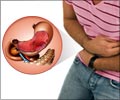Drugs commonly prescribed for heart burn may lead to weaker bones says researchers.
A study conducted in Britain has brought to light that taking drugs to ease heart burn regularly for over a year could increase the chances of landing with a fractured hip sooner or later.Drugs like Prevacid ,Nexium or Prilosec are drugs used to relieve heartburn.The risk is raised for people who are over 50 years of age.
The researchers have postulated that these drugs that help to sort out the acidity factor in the stomach, also upsets the capacity of the body to take up calcium which is crucial for maintaining the bone density .Reasonable amount of acid is required in the intestinal tract in order to dissolve calcium salts, so that it may be absorbed into the cells. Without calcium the bones will ultimately become brittle and suffer fractures.Fractures in the hip are often life threatening if it occurs in the elderly. Unless left with no other option, doctors should hence forth be cautious before they add another antacid to the list of prescription drugs for an elderly patient for a long term. Co-author of the study Dr. Yu-Xiao Yang from the University Of Pennsylvania School Of Medicine, opined that drugs given for heart burn are generally considered harmless. This leads to the folly of using it indiscriminately at times.
Many people find no relief from symptoms of heart burn with antacids that are commonly available over the counters even without a prescription. Those with long standing heart burn may also suffer from ulcers in the upper part of the gastro intestinal tract.
More than 145,000 cases were studied for this research in England. The results of the study, was published Journal of the American Medical Association. Most of the patients that were studied were over 50 years of age. The patients who used these groups of drugs also termed as proton pump inhibitors for over a year had a higher risk of 44 percent of hip fracture than those who refrained from using these drugs. The risk seemed higher when the use was prolonged.
The manufacturers of the drugs of this type were defensive following the publishing of this study. They opined that the study does not offer concrete proof that these drugs have a direct bearing on hip fractures.
Advertisement
MST











